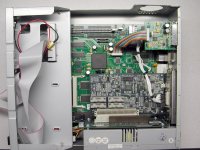Configurable SoC cores gain SIMD instructions, support Linux
Oct 28, 2005 — by LinuxDevices Staff — from the LinuxDevices Archive — viewsA provider of configurable, licensable CPU/DSP core IP (intellectual property) for system-on-chip (SoC) processors is adding SIMD (single-instruction, multiple-data) instruction support. ARC's forthcoming Multimedia Subsystem will support 104 new 128-bit-wide SIMD instructions that can reduce power and improve performance in mobile applications by exploiting the parallelism inherent in multimedia… applications, the company says.
ARC's Linux support partner, Codito, says it will support ARC's new SIMD instructions. Codito sells Linux and uClinux BSPs (board support packages) and GNU-based toolchains for several ARC products, including the ARC 700 core.
According to ARC, the SIMD-enabled Multimedia Subsystem will be compatible with both the 16- and 32-bit ARCompact ISAs (instruction set architectures). It claims the instructions can better exploit application-level parallelism, compared to superscalar architectures and symmetric multi-threading. The instructions will improve multimedia performance up to 10 times, the company claims.
Additionally, SIMD instructions provide a more intuitive programming environment than separate media coprocessors, the company claims. ARC's new SIMD extensions won a “product of the year” award at the Global Signal Processing conference (GSPx), Oct. 24-27 in Santa Clara, the company says.
 In addition to licensable chip IP, ARC sells development and prototyping tools, such as the ARCangel Prototyping Tool pictured at right. It allows engineers to optimize and debug both hardware and software configurations before production of actual silicon, the company says.
In addition to licensable chip IP, ARC sells development and prototyping tools, such as the ARCangel Prototyping Tool pictured at right. It allows engineers to optimize and debug both hardware and software configurations before production of actual silicon, the company says.
Codito CEO Patanjali Somayaji said, “We see a lot of value provided to SoC designers, because they now can exploit application level parallelism and the immense configurability of ARC cores.”
This article was originally published on LinuxDevices.com and has been donated to the open source community by QuinStreet Inc. Please visit LinuxToday.com for up-to-date news and articles about Linux and open source.